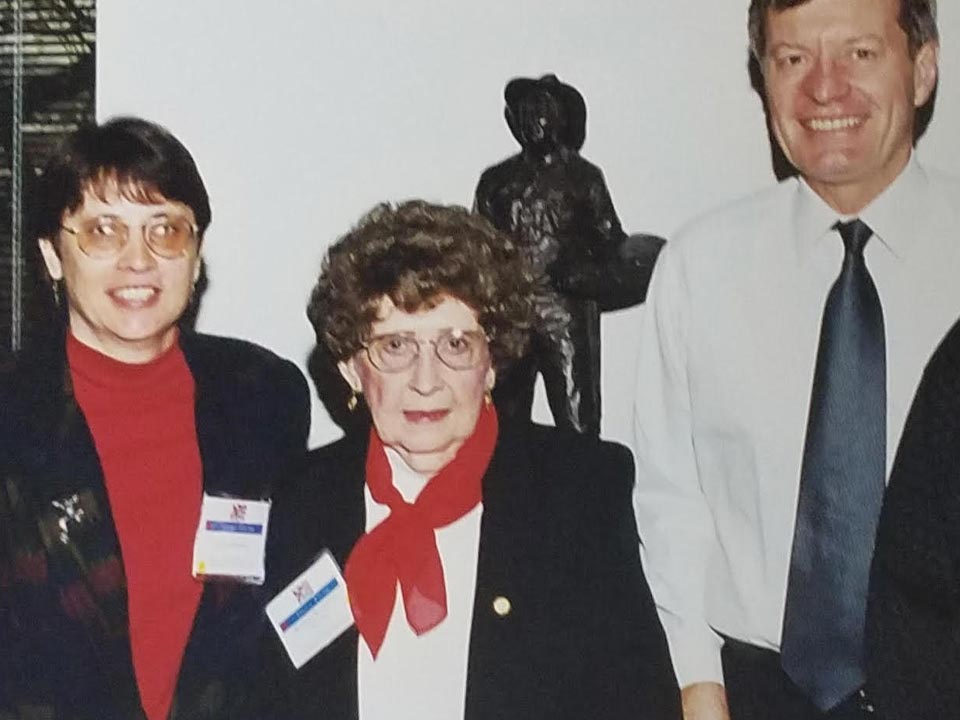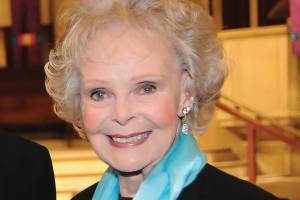By CRAIG THOMAS NAYLOR
Hauling a bull to South Dakota? How about a bred heifer to Hawaii, a parrot to Pennsylvania, a hog to Hollywood, or bovine semen to Brazil?
From 1970 through 2005, you would have needed approval from Rosella Whitehead, export certification specialist with the US Department of Agriculture office in Helena, Mont.
When a circus entered or left the state, the elephants, tigers, and lions had to jump through Rosella’s hoops. A horse leaving for the Kentucky Derby had to wait at the starting gate until Rosella processed the papers.
She did all this after she’d turned 50.
Rosella Mires was born in Winston, Mont., in 1918. This now-small town southeast of Helena was prosperous then, with trains running through, mines in the hills producing gold and silver, ranching and farming filling the flats.
Her father owned the general store. He fed the “hobos” a hot dinner every Sunday.
Rosella was only 7 years old when Marie, her mother, passed away—from cancer. Her grandparents, Kalispell homesteaders Charlie and Elizabeth Bonathan, moved down for a while, caring for Rosella and her siblings while Marie received treatment at the Mayo Clinic, but the treatment was not successful.
Rosella never quite recovered and spoke of her sadness to her last days. Her father never remarried.
At 18, Rosella was hired as Winston’s Postmaster, the youngest in the country. This was during the Great Depression and the 1930s brucellosis outbreak that decimated the Plains economy. She was lucky to have a job.
She worked out of a cubicle near a small wood stove in the back of the general store.
“As postmaster, it was my job to go down to the train depot to deliver and retrieve the mail.” she once wrote. “In those days a mailbag was placed on a long metal rod by the railroad tracks, allowing the mail carrier to reach out from the moving train and pick it up. Another mail carrier stood in the doorway and threw a large mailbag to me. The big steam locomotive never stopped as it flew by at full speed.”
Rosella married Charles “Willard” Whitehead in June 1942. Willard supported the War effort working for General Electric in Seattle and Butte before being sent to the Philippines to fight in the Pacific. After the war, they settled in Townsend, where Willard owned the Texaco station and sold Case machinery, while Rosella raised their four children, including the youngest, Candi, my wife.
Economic hardship hit the family, and, at age 50, Rosella needed a job. A confirmed recluse, this took a leap of courage and all of Rosella’s emotional fortitude. She found work with the USDA office in Helena, just across from the state Capitol.
Gracious, efficient, and polite, it didn’t take long for her to know the ranchers in the state. She was a celebrity to many.
When they’d find out I was her son-in-law, they’d smile, they’d nod their head, and I’d be elevated to legendary status, part of the clan, but one notch below Rosella herself, of course.
In 1999, Rosella, then a spry and active 81 years old, received the Prime Time Award as the oldest productive worker in the state of Montana. She was also the oldest worker in the Department of Agriculture.
The sponsors, the Green Thumb organization, flew Rosella to Washington D.C., where she joined the winners from the other states for three days of tours, honors, and banquets.
Then-Senator Conrad Burns treated Rosella like a queen. She was impressed, particularly liking his cowboy boots and belt buckle.
Green Thumb began in 1965 as a project of the National Farmers Union, to help elderly growers retain their livelihood. The name changed in 2005 to Experience Works, and their mission expanded to job training for seniors with an emphasis on new technologies.
This program, now called the Senior Community Service Employment Program, administered by the US Department of Labor, fit right in with Rosella.
“Little did I know that I would go from a hand-crank phone and telegraph to watching Neil Armstrong step on the moon,” she stated. “It is my belief that the best way to sustain our freedom and realize our dream of prosperity is through advances in technology.
Rosella retired in fall 2005 and passed away a few months later—from cancer, just like her mother. She retained that Montana trust in the future, stoic, gracious, until the pain of her final two days took it from all of us.
Reclusive to the end, Rosella didn’t want an obituary. Her children and their spouses, however, felt the ranchers of the state needed to know, so we placed a brief one in the local papers. We were going to add a picture, one that would have been great for this article, but the strangest thing happened.
We laid Rosella’s ashes to rest. Afterward, we gathered in Rosella’s apartment, her photo on the table, surrounded by those who loved her. We raised a glass of “white zin,” her favorite, and celebrated a life well-lived. At that moment, on this otherwise still day, wind blasted through the apartment. Curtains flapped, and hats flew.
It lasted only a second or two, but, when the tempest passed, Rosella’s picture was gone. We searched. We pulled the fridge out and looked behind. On hands and knees. We looked under the furniture. We looked everywhere. We never found it.
Even in death, Rosella had the last laugh, accepting no uncertified bull, even from her children. MSN








